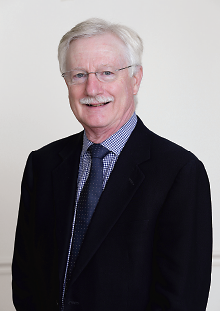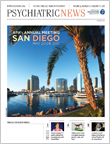New technologies to diagnose and treat alcohol use disorder and the effects of alcohol across the lifespan will be among the topics highlighted in the National Institute on Alcohol Abuse and Alcoholism (NIAAA) research track at APA’s Annual Meeting in San Diego.
“We know that one in five individuals seeking psychiatric treatment has at least one co-occurring substance use disorder,” NIAAA Director George Koob, Ph.D., told Psychiatric News. “We want APA members to have a deeper understanding of the neuroscience of alcohol use disorder and a working knowledge of technological and behavioral interventions and FDA-approved treatments for AUD.”
The symposium will kick off at 8 a.m. on Monday, May 22, with “Using Mobile Phone- and Web-Based Technology to Enhance Treatment and Support Recovery”—a session highlighting several technologies shown to improve treatment retention, reduce relapse, and more.
During the session, Kathy Jung, Ph.D., director of the Division of Metabolism and Health Effects at NIAAA, will discuss a biosensor under development at NIAAA that tracks changes in blood alcohol levels. The sensor, which can be embedded in a watch, sends information to a secure online database where clinicians and patients can view alcohol use over a given period.
“Currently, we rely on self-report measures to assess past seven-day alcohol consumption in patients seeking treatment,” said Robert Huebner, Ph.D., acting director of the Division of Treatment Recovery Research at NIAAA. Because such self-reports can be prone to error, Huebner said the wearable devices may enhance the ability of clinicians to accurately measure alcohol intake. According to Huebner, such information could “revolutionize clinical research.”
The NIAAA symposia will also explore the challenges of treating comorbid AUD and psychiatric disorders.
During the “Treating Co-Occurring Posttraumatic Stress Disorder and Alcohol Use Disorder” session on Monday, researchers will describe the latest evidence to support promising treatments for patients with co-occurring PTSD and AUD, including oxytocin and cognitive-behavioral therapy.
As part of this session, Charles Marmar, M.D., a professor and chair of psychiatry at New York University’s Langone Medical Center will discuss his efforts to uncover biological markers of PTSD and comorbid AUD among veterans and active members of the military. Such biomarkers may offer an objective measure to pinpoint individuals with PTSD who are at risk for AUD and those with AUD who are at risk for PTSD.
“About 50 percent of people with issues of alcohol misuse have significant PTSD symptoms,” Marmar told Psychiatric News. “Detecting biomarkers in the brain and blood could help detect those with alcohol use disorder who have PTSD symptoms, whether the patient is aware of emotional distress or not, and help clinicians choose appropriate therapies to treat both conditions.”
On Tuesday, May 23, Anne Joseph, M.D., Wexler Professor of General Internal Medicine at the University of Minnesota Medical School, will chair a session exploring behavioral and pharmacological interventions to address co-occurring tobacco and alcohol use disorders. Motivational interviews, varenicline and naltrexone, and clinical decision-making tools for integrated interventions for alcohol and tobacco use will be discussed.
The long-term effects of binge drinking during adolescence and the dangers of older adults drinking alcohol while taking medications will be among the topics explored in sessions on Wednesday, May 24.
The National Consortium on Alcohol and Neurodevelopment in Adolescents (NCANDA) will lead a morning symposium describing findings from its longitudinal study investigating the impact of binge drinking on brain and behavioral development in 831 youth aged 12 to 21. The session will examine the negative consequences of alcohol on adolescent development and discuss how NCANDA’s findings may help to inform the implementation of interventions, treatment practices, and regulatory policies concerning alcohol use among youth.
The NIAAA symposium will conclude on Wednesday afternoon, with a session on alcohol use in older adults. Recommended pharmacotherapies for alcohol use disorder in older adults, the risks of drinking while on other medications, and the relationship between drinking and marriage quality are among the topics to be explored. ■
The schedule of sessions in the NIAAA re-search track will be published in the program guide distributed at the meeting and in the APA Meetings App.

